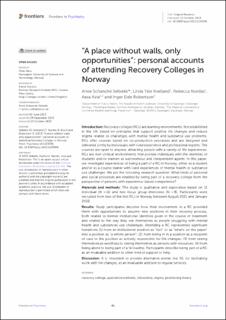| dc.contributor.author | Selbekk, Anne Schanche | |
| dc.contributor.author | Kvelland, Linda Teie | |
| dc.contributor.author | Nordås, Rebecca | |
| dc.contributor.author | Kvia, Aasa | |
| dc.contributor.author | Robertson, Inger Eide | |
| dc.date.accessioned | 2023-11-22T12:56:19Z | |
| dc.date.available | 2023-11-22T12:56:19Z | |
| dc.date.created | 2023-11-21T11:04:07Z | |
| dc.date.issued | 2023 | |
| dc.identifier.citation | Selbekk, A. S., Kvelland, L. T., Nordås, R., Kvia, A., & Robertson, I. E. (2023). “A place without walls, only opportunities”: personal accounts of attending Recovery Colleges in Norway. Frontiers in Psychiatry, 14, 1233598. | en_US |
| dc.identifier.issn | 1664-0640 | |
| dc.identifier.uri | https://hdl.handle.net/11250/3104134 | |
| dc.description.abstract | Introduction: Recovery colleges (RCs) are learning environments, first established in the UK, based on principles that support positive life changes and reduce stigma related to challenges with mental health and substance use problems. RCs offer courses based on co-production processes and are designed and delivered jointly by individuals with lived experience and professional experts. The courses are open to anyone, attracting people with a variety of life experiences. RCs are non-clinical environments that provide individuals with the identities of students and/or trainers as autonomous and independent agents. In this paper, we investigate experiences of being a part of a RC in Norway, either as a student and/or as a course trainer with lived experiences of mental health or substance use challenges. We ask the following research question: What kinds of personal and social processes are enabled by being part of a recovery college from the perspective of persons with experience-based competence?
Materials and methods: The study is qualitative and explorative based on 11 individual (N = 11) and two focus group interviews (N = 8). Participants were recruited from two of the first RCs in Norway between August 2021 and January 2022.
Results: Study participants describe how their involvement in a RC provided them with opportunities to assume new positions in their recovery process, both related to former institutional identities given in the course of treatment and related to the way they see themselves as people struggling with mental health and substances use challenges. Attending a RC represented significant transitions (1) from an institutional position as “sick” or as “what’s on the paper” into a position as “a whole person”; (2) from being in in a position as a recipient of care to the position as actively responsible for life changes; (3) from seeing themselves as worthless to seeing themselves as persons with resources; (4) from being alone to being part of a fellowship. Participants describe being part of a RC as an invaluable addition to other kind of support or help.
Discussion: It is important to provide alternative arenas like RC for facilitating work with life changes, as an invaluable addition to regular services. | en_US |
| dc.language.iso | eng | en_US |
| dc.publisher | Frontiers | en_US |
| dc.rights | Navngivelse 4.0 Internasjonal | * |
| dc.rights.uri | http://creativecommons.org/licenses/by/4.0/deed.no | * |
| dc.title | “A place without walls, only opportunities”: personal accounts of attending Recovery Colleges in Norway | en_US |
| dc.type | Peer reviewed | en_US |
| dc.type | Journal article | en_US |
| dc.description.version | publishedVersion | en_US |
| dc.rights.holder | © The Author(s) 2023 | en_US |
| dc.subject.nsi | VDP::Medisinske Fag: 700 | en_US |
| dc.source.journal | Frontiers in Psychiatry | en_US |
| dc.identifier.doi | 10.3389/fpsyt.2023.1233598 | |
| dc.identifier.cristin | 2199413 | |
| cristin.ispublished | true | |
| cristin.fulltext | original | |
| cristin.qualitycode | 1 | |

